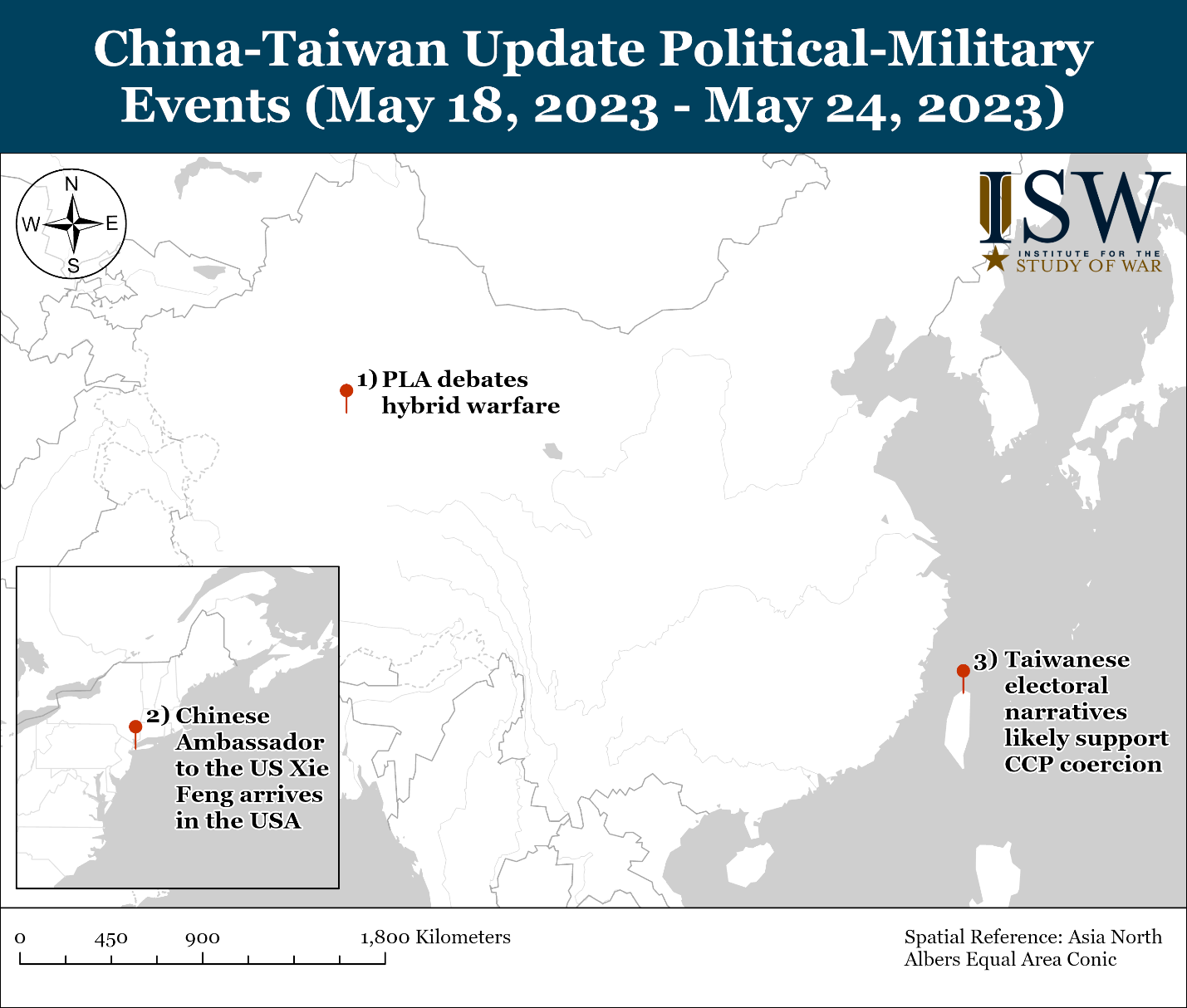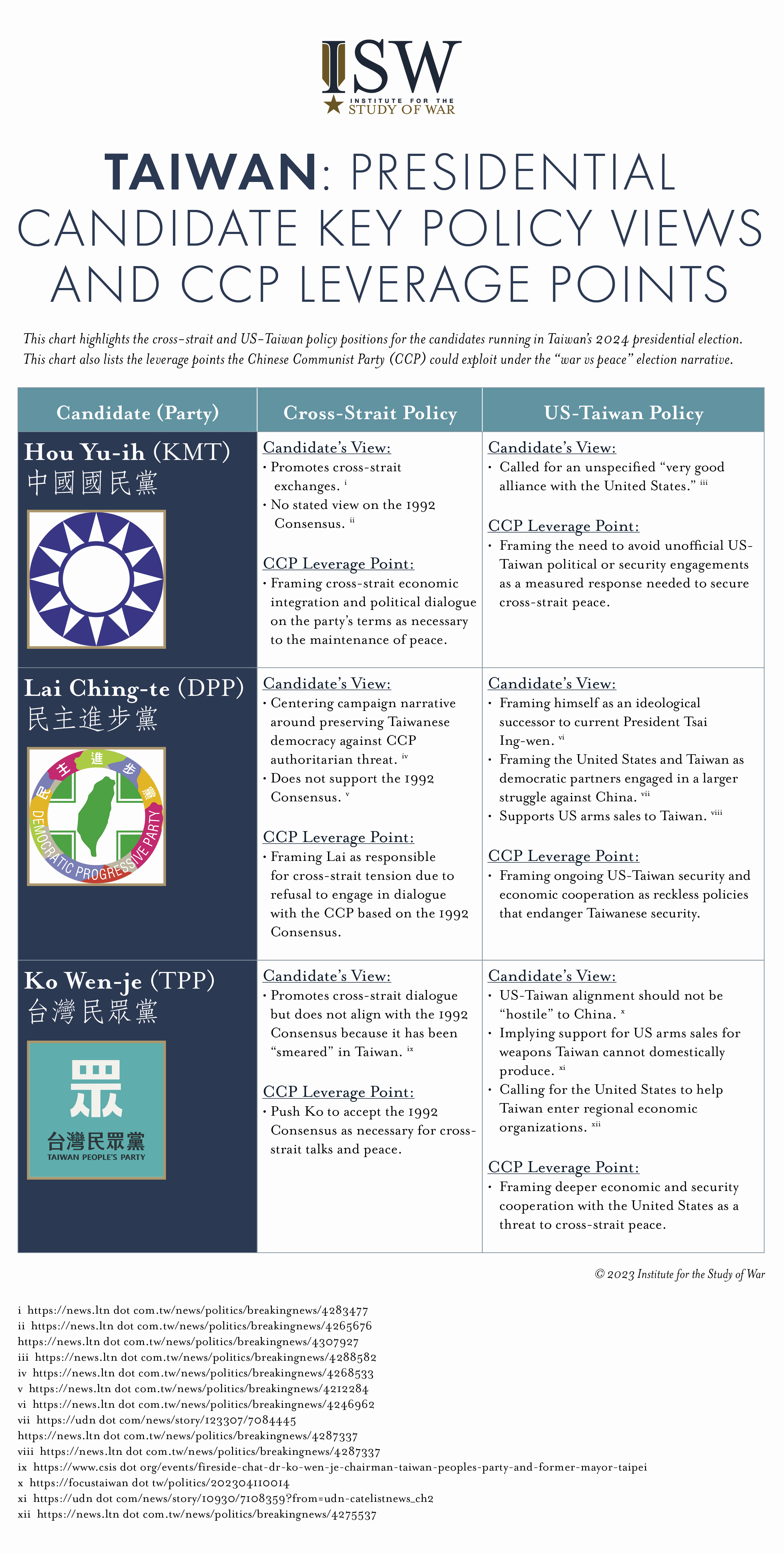{{currentView.title}}
May 26, 2023
China-Taiwan Weekly Update, May 26, 2023
Editors: Dan Blumenthal and Frederick W. Kagan of the American Enterprise Institute
Data Cutoff: May 24, 2023
The China–Taiwan Weekly Update focuses on Chinese Communist Party paths to controlling Taiwan and relevant cross–Taiwan Strait developments.
Key Takeaways
- The People’s Liberation Army debates on the strategic role of hybrid warfare may mean the CCP’s ongoing “unification” campaigns targeting Taiwan do not primarily rely on military force.
- The recent appointment of Xie Feng as Chinese Ambassador to the United States is unlikely to initiate a thawing of Sino-American relations by the CCP.
- The dominant but contested domestic framing of the 2024 Taiwanese presidential election as a choice between peace and war likely supports CCP efforts to coerce Taiwan into supporting cross-strait engagement. Framing the upcoming election as a choice between war and peace, regardless of the election result, likely supports the CCP’s objective to alter Taiwan’s security policy towards the United States.

China Developments
This section covers relevant developments pertaining to China and the governing Chinese Communist Party (CCP).
The People’s Liberation Army’s debates on the strategic role of hybrid warfare may mean the CCP’s ongoing “unification” campaigns targeting Taiwan do not primarily rely on military force. This is a low confidence assessment. The PLA debate on hybrid warfare broadly revolves around theories that emphasize a holistic conception of national strength and state power.[1] More precise theories place political and public opinion as the lead elements of hybrid warfare, which military force undergirds.[2] The concept of “comprehensive national strength” also plays a role in PLA internal debates on hybrid warfare because the party sees it as the way that great powers compete, which includes over Taiwan, to avoid traditional large scale military-to-military confrontation.[3] The PLA Western Theater Commander Wang Haijiang, who has commanded in various capacities in western China such as Xinjiang since the mid-2010s, entered this debate on May 14.[4] He published an article defining hybrid warfare as revolving around a “contest of comprehensive national strength” while avoiding discussions on how to implement this concept.[5] The term “comprehensive national strength” includes ongoing Chinese military modernization and expansion as well as PLA attempts to reduce Taiwanese sovereignty via military actions like air defense identification zone violations. Wang’s views on hybrid warfare are in line with the broad contours of the PLA debate on the topic, which reflects existing Chinese debates among military theorists.
Chinese conceptions of hybrid warfare may also aim to avoid direct military confrontation with the United States. This is a low confidence assessment. Select Chinese theorists draw from Russia’s 2014 annexation in Crimea to emphasize how to successfully employ non-kinetic means in combination with special forces during hybrid warfare.[6] The more precise hybrid warfare theories viewing use of force as an undergirding element of hybrid warfare demonstrates awareness in segments of the PLA of its comparative weakness to United States and allied forces. The party potentially aims to avoid an existential military confrontation over Taiwan that it could lose in favor of coercion campaigns as seen by it drawing from the aforementioned examples where military force is one among many components. Ongoing PLA modernization and expansion present opportunities for this calculus to change.
The recent appointment of Xie Feng as Chinese Ambassador the United States is unlikely to initiate a thawing of Sino-American relations by the CCP. He served in several North America-related posts in the Ministry of Foreign Affairs from the 1990s to the early 2010s, including in the United States from 2008-2010.[7] Xie also played a key role in securing the release of Huawei’s Chief Financial Officer Meng Wanzhou after she was arrested on charges of bank fraud in 2018.[8] He previously helped implement the crackdown on pro-democracy Hong Kong protestors from 2019-2020.[9] China has not had an ambassador to the United States since promoting the prior ambassador Qing Gang to Minister of Foreign Affairs in January 2023. Filling the ambassador post is normal diplomatic practice. Xie’s previous statements on the beneficial nature of Sino-American cooperation is standard rhetoric to attract foreign investment as the Chinese economy emerged from Zero-Covid, not evidence for potential thawing in Sino-American relations.[10] Xi Jinping’s use of anti-espionage laws to raid foreign firms to advance domestic technological and manufacturing self-reliance indicates that any potential thawing in relations will not translate into meaningful CCP action on the ground.[11] The willingness of select CCP leadership like Commerce Minister Wang Wentao to engage in high-level meetings with relevant American officials combined with the potential absence of Chinese aggressive ”wolf-warrior” diplomacy during Xie Feng’s tenure in America does not equate to a thaw in Sino-American relations by the CCP.[12]
Taiwan Developments
This section covers relevant developments pertaining to Taiwan, including its upcoming January 13, 2024 presidential and legislative elections.
Elections
The Taiwanese (Republic of China) political spectrum is largely divided between the Democratic Progressive Party (DPP) and the Kuomintang (KMT). The DPP broadly favors Taiwanese autonomy, Taiwanese identity, and skepticism towards China. The KMT favors closer economic and cultural relations with China along with a broader alignment with a Chinese identity. The DPP under President Tsai Ing-wen has controlled the presidency and legislature (Legislative Yuan) since 2016. This presidential election cycle also includes the Taiwan People’s Party (TPP) candidate Ko Wen-je who frames his movement as an amorphous alternative to the DPP and KMT. It is normal for Taiwanese presidential elections to have third party candidates, but none have ever won. The 2024 Taiwan presidential and legislative elections will be held on January 13, 2024 and the new president will take office in May 2024. Presidential candidates can win elections with a plurality of votes in Taiwan.
The dominant but contested domestic framing of the 2024 Taiwanese presidential election as a choice between war and peace likely supports CCP efforts to coerce Taiwan into supporting cross-strait engagement. KMT legislators and party elders like former President Ma Ying-jeou refer to the election as a choice between war and peace by arguing that ruling DPP cross-strait policies will lead Taiwan to war.[13] DPP presidential nominee Lai Ching-te (William Lai) criticized this framing by saying that “the president of Taiwan will be decided by China” if war threats influence voting results.[14] Lai frames the election as a choice between democracy and authoritarianism, which channels current President Tsai Ing-wen‘s 2020 election rhetoric stressing the defense of the status quo and Taiwanese democracy in the face of a rising Chinese authoritarian threat.[15] The “war or peace” framing advantages the KMT by making their calls for cross-strait engagement appear necessary to preserve the status quo.
Framing the upcoming election as a choice between war and peace, regardless of the election results, likely supports the CCP’s objective to alter Taiwan’s security policy toward the United States. This perspective can effectively frame Taiwanese military and political engagements with the United States, such as arms sales and unofficial political exchanges, as irresponsible acts that risk war in the eyes of Taiwanese voters. This electoral viewpoint could constraint the next Republic of China (Taiwan) president’s policy options regarding US-Taiwan relations. These constraints become CCP leverage points that the party could use to push Taiwan to take part in cross-strait or international engagements on PRC terms.
CCP Leverage Points
Terminology: 1992 Consensus: a disputed cross-strait policy formulation supported in different formations by the CCP and KMT that acts as a precondition to cross-strait dialogue. The DPP does not support the 1992 Consensus.

[1] http://www.81 dot cn/jfjbmap/content/2022-09/29/content_325064.htm
http://www.81 dot cn/jfjbmap/content/2021-08/19/content_296897.htm
https://mp.weixin dot qq.com/s/f8qTtzuqsfMLDUWjqQDI0g
[2] http://www.81 dot cn/jfjbmap/content/2021-08/12/content_296331.htm
[3] http://www.81 dot cn/ll_208543/10071341.html
[4] https://www.thepaper dot cn/newsDetail_forward_1560766
https://www.163 dot com/dy/article/G6R09V09051482MP.html
http://m.news dot cctv.com/2021/09/06/ARTIibYCBu6ODfgpcvQ2lSRM210906.shtml
https://mp.weixin dot qq.com/s/f8qTtzuqsfMLDUWjqQDI0g
[5] https://mp.weixin dot qq.com/s/f8qTtzuqsfMLDUWjqQDI0g
[6] http://www.81 dot cn/jfjbmap/content/2021-08/26/content_297639.htm
[7] https://web.archive dot org/web/20220515111224/http://district.ce.cn/newarea/sddy/202102/19/t20210219_36321619.shtml
[8] https://www.wsj.com/articles/huawei-china-meng-kovrig-spavor-prisoner-swap-11666877779?mod=article_inline
[9] https://www.chinadaily dot com.cn/a/201908/15/WS5d54dba4a310cf3e35565eb1.html
[10] https://www.wsj.com/articles/new-chinese-ambassador-departs-for-the-u-s-under-a-cloud-of-uncertainty-1931ac35
[11] https://www.understandingwar.org/backgrounder/china-taiwan-weekly-update-may-12-2023#_edn0c56c30f3c69d42c7fed0872f9b34c536
[12] https://www.voanews.com/a/top-us-chinese-trade-officials-meeting-in-washington-/7108817.html
[13] https://www.chinatimes dot com/realtimenews/20230524003403-260407?chdtv
https://news.ltn dot com.tw/news/politics/breakingnews/4311311
https://www.reuters dot com/world/asia-pacific/taiwan-faces-choice-peace-war-ex-president-says-after-china-trip-2023-04-07/
[14] https://news.ltn dot com.tw/news/politics/paper/1584231
[15] https://news.ltn dot com.tw/news/politics/paper/1584231
https://international.thenewslens dot com/feature/taiwan2020/129435
